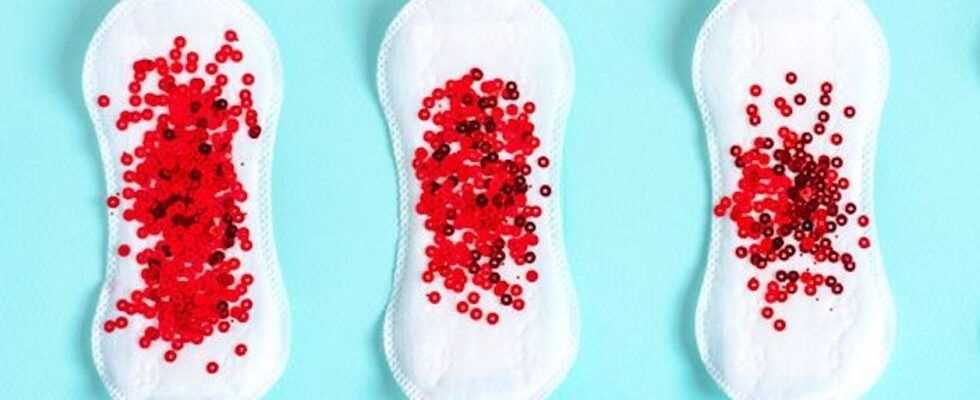Between 20 and 30% of women of childbearing age suffer from heavy periods, called menorrhagia in medical jargon. Fatigue, anemia, anxiety … Heavy bleeding can have a negative impact on the daily lives of women. How do you know if you have heavy periods? What are the causes ? Which solutions? Our advice to relieve menorrhagia.
The heavy periods, called menorrhagia, is more profuse bleeding than usual, and requires a large number of protections per day. Today, more than 1 in 5 women suffer from heavy periods. * These menorrhagia can have a negative impact on daily life. The heavy periods must be the subject of a gynecological consultation and solutions exist to treat them. How do you know if your period is heavy? How to calculate your Higham score? What to do and when to worry? We take stock with Odile Bagot, gynecologist-obstetrician.
* Royal College of Obstetricians and Gynaecologists. National heavy menstrual bleeding audit. First annual report. May 2011.
"Normal" or heavy periods?
Menstruation lasts an average of 3 to 6 days depending on the woman. During this period, a woman loses on average between 35 to 40 mL per cycle. We talk about heavy periods or menorrhagia when the rules last more than 7 days, that we lose more than 80 mL per cycle and that it is necessary to double and / or change hygienic protection very often during the day.
How do you know if you have heavy periods?
"The official official doctrine to know if you lose too much blood is to calculate your losses using the Higham score, recommended by the CNGOF (National College of Gynecologists and Obstetricians French)" explains Odile Bagot, gynecologist-obstetrician. It is a table to be filled which allows to estimate the abundance of menstruation. However, assessing the quantity of losses remains subjective.
The gynecologist recommends going to see a doctor for a blood test. "To assess blood loss, we look at what remains of red blood cells and hemoglobins. People who bleed too much will draw on their iron stores, which gradually decrease hemoglobins. Over months, they will become anemic, will find that they are tired, out of breath " she alerts. It is then a first sign of alarm that something must be done to bleed less. Women with heavy periods will first need to supplement with iron to avoid this anemia.
The Higham score calculation method
Download and print a bleeding calendar first to help you track your flow. You will find a very practical and fun one on the site regles-abondantes.fr.
From the first day of your period, specify the number of tampons and / or towels you use each day in the box corresponding to the level of impregnation (tampon and / or towel moderately, completely or slightly soaked).
Once the calendar is completed, add the points to get your Higham score:
- If your final score is greater than 100, you may be suffering from heavy periods. Talk to your gynecologist.
- Your total score is less than 100, your losses do not seem abundant (bleeding less than 80 mL).
If you have any doubts or other symptoms, do not hesitate to make an appointment with your gynecologist for his opinion.
Heavy periods: what causes?
- A hormonal imbalance at puberty or perimenopause
- An abnormality in the uterine cavity: fibroma or polyp
- A adenomyosis, a form of endometriosis that is characterized by the presence of endometrial tissue in the thickness of the uterine wall (the myometrium)
- The presence of a Copper IUD (IUD) may be responsible for menorrhagia
Other possible, but rarer, causes:
- A haemophilia, a genetic hemorrhagic disease that prevents blood clotting
- Taking certain medications such as anti coagulants
What to do in the event of heavy periods?
The treatment for your menorrhagia differs according to their cause.
At first, if you have anemia, you will need iron supplementation. If no pathology is involved, your doctor may prescribe anti-fibrinolytics (tranexamic acid), anti-inflammatories and progestins (progesterone-like substances) orally. If the copper IUD is responsible for heavy bleeding, you can turn to a progesterone IUD. The contraceptive pill generally helps regulate the abundance of rules.
"For menstrual bleeding related to fibroids or endometriosis, GnRH analogs, Decapeptyl® and Enantone® are prescribed, which cause menstruation to stop and bleeding. These treatments put the woman in artificial menopause for 3 to 6 months ” explains Dr Odile Bagot.
Menorrhagia: when to worry?
"If it overflows, if you have leaks, if you have to double your protections (tampon + towel), if you start to feel tired or lose your hair, it is absolutely necessary to consult a doctor" warns the obstetrician-gynecologist.
An Opinium Research study of 1000 women who have or have had heavy periods has demonstrated the negative impact on mental and physical health as well as social and professional life. 92% of them felt irritable or moody, 78% reported lack of self-confidence, 74% experienced anxiety. On the physical level, 87% of women felt a extreme fatigue and near1 in 2 women had anemia. 48% had already been absent from work due to their heavy periods. On a daily basis, 43% had already canceled a planned meal outside with friends and 58% did not feel able to carry out their usual activities for at least 1 day per cycle.
If your daily life is dictated and impacted by your rules, it is a sign that it is time to act.
Thanks to Odile Bagot, gynecologist and author of Vagin & Cie, we tell you everything! and endocrine disruptors, war is declared! MANGO editions.
See as well :
The best menstrual pants for heavy flow
